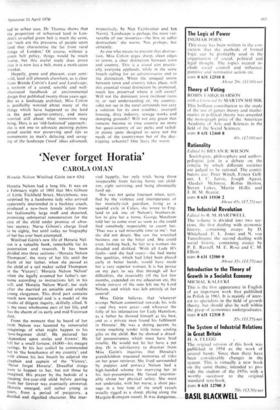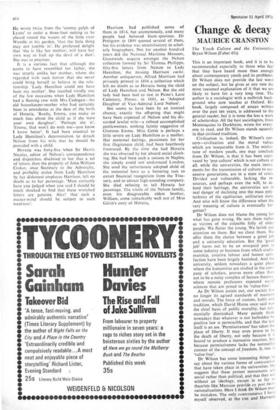'Never forget Horatia'
CAROLA OMAN
Horatia Nelson Winifred Gerin (our 63s)
Horatia Nelson had a long life. It was on a February night of 1801 that Mrs Gibson of Little Titchfield Street, Marylebone, was surprised by a handsome lady who arrived apparently unattended in a hackney coach, produced a new-born female infant from her fashionably large muff and departed, promising substantial remuneration for the care of the child under promise of abso- lute secrecy. Nurse Gibson's charge lived to be eighty, but until today no biography of her has ever been attempted.
Winifred Gerin's new life of Horatia Nel- son is a valuable book, remarkable for its penetration and research. It has been divided into three sections—'Horatia Nelson Thompson', the story of her life until the death of her father, when she passed as the child of a sail maker called Thompson in the 'Victory'; 'Horatia Nelson Nelson' when she legally assumed her father's sur- name according to instructions left in his will, and 'Horatia Nelson Ward', her style after she married an amiable and erudite young clergyman. This third part contains much new material and is a model of the results of diligent inquiry, skilfully sifted. It is the most wholesome part of her life, and has the charm of its early and mid-Victorian date.
From the moment that he heard of her birth Nelson was haunted by remorseful imaginings of what might happen to his 'love-begotten child'. He pictured her 'dependent upon smiles and frowns'. He left her a small fortune, f4,000—his meagre savings. In his last codicil he commended. her to 'the beneficence of my country', and with almost his last breath he adjured the chaplain and captain of the 'Victory', 'Never forget Horatia'. Dreadful things were to happen to her, but not those he imagined. His prayer by the bedside of a Sleeping five-year-old child before parting from her forever was eventually answered. Horatia emerged, still rather young in Years, from a period of purgatory, a decided and dignified character. She mar-
ried happily, her ()illy trials being those inseparable from having borne ten child- ren, eight surviving, and being chronically hard up.
She was not quite fourteen when, terri- fied by the violence and intemperance of her mortally-sick guardian, living as a squalid exile in Calais, she wrote to Eng- land to ask one of Nelson's brothers-in- law to give her a home. George Matcham told her to come over as soon as she could find somebody respectable to escort her. 'That was a sad miserable time to me': but she did not desert. She saw the wretched business out to the bitter end. She could even, looking back, be fair to a woman she dreaded and disliked. 'With all Lady H's faults—and she had many—she had many fine qualities, which had [she) been placed early in better hands, would have made her a very superior woman. It is but justice on my part to say that through all her difficulties, she invariably till the last few months, expended on my education etc, the whole interest of the sum left me by Lord Nelson, and which was left entirely at her control'.
Miss Gerin believes that 'whatever wrongs Nelson committed towards his wife —and they were great—and whatever the folly of his infatuation for Lady Hamilton, as a father he showed himself at his best, and as a private man found his fulfilment in Horatia'.. He was a doting parent; he wrote touching tender little notes sending gifts to the child. But he showed a dread- ful possessiveness which must have bred trouble. He would not let her have a pet dog. (It is satisfactory to discover from Miss Gerin's inquiries that Horatia's grandchildren treasured memories of rides on her great retriever. She lived surrounded by puppies and ponies.) Nelson had a high-handed scheme for marrying her to his heir-presumptive. He fussed intermin- ably about her physical safety. She must not undertake, with her nurse, a short pas- sage in a hoy (one of the small vessels usually rigged as a sloop, plying along the Margate-Ramsgate coast). It was dangerous. Ile wrote twice from the 'stormy gulph of Lyons' to order a three-foot netting to be placed round the waters of the little river Wandle in his garden, 'that the little thing may not tumble in'. He professed delight that 'she is like her mother:, will have her own way or kick up the devil of a dust'. She was so precious.
It is a curious fact that although she seems to have resembled her father, she was utterly unlike , her mother, whom she regarded with such horror that she never could bring herself to believe in the rela- tionship. 'Lady Hamilton could not have been my mother'. She recalled vividly one of the few occasions when Lady Hamilton had a flaming row with Mrs Cadogan—the old housekeeper-mother who had certainly been in attendance at the date of the birth of Horatia. 'Really, Emma, you make so much fuss about the child as if she were your own daughter'. 'Perhaps she is'. 'Emma, that won't do with me—you know I know better'. It had been essential to Lady Hamilton's determination to detach Nelson from his wife that he should be provided with a child.
Horatia was forty-five 'when Sir Harris Nicolas, editor of Nelson's correspondence and dispatches, disclosed to her that a set of letters, then the property of John William Croker, once Secretary to the Admiralty, and probably stolen from Lady Hamilton by her dishonest employee Harrison, left no doubt as to her parentage. 'Most correctly have you judged when you said I should be much shocked to find that these wretched letters are genuine. Alas! that such a master-mind should be subject to such weakness'. Harrison had published some of them in 1814, but anonymously, and many people had believed them spurious. Dr Pettigrew in 1849 quoted several of them, but his evidence was unsatisfactory to schol- arly biographers. Not for another hundred years did the National Maritime Museum, Greenwich, acquire amongst the Nelson collection formed by Sir Thomas Phillipps, fifty-five letters from Nelson, to Lady Hamilton, the missing Harrison cache. Another antiquarian, Alfred Morrison had privately printed in 1894 a collection winch left no doubt as to Horatia being the child of Lady Hamilton and Nelson. But the old lady had been laid to rest in Paine's Lane Cemetery, Pinner, in 1881, as 'Adopted Daughter of Vice-Admiral Lord Nelson'.
She seems to have been by an ironical chance, exactly the offspring that might have been expected of Nelson and his dis- carded lawful wife—a refined accomplished gentlewoman, nothing faintly suggestive of Glorious Emma. Miss Germ is perhaps a little severe on Lady Hamilton as a mother. Her maternal feelings, passionate for her first illegitimate child, had been heartlessly frustrated. By the time she had Horatia she was obsessed by her absurd social climb- ing. She had been such a success in Naples; she simply could not understand London. She used the unfortunate adopted child of the immortal hero as a battering ram to extort financial recognition from the Trea- sury, and to attract high-sounding company. She died refusing to tell Horatia her parentage. The whole of the Nelson family, even his disagreeable eldest brother, William, come remarkably well out of Miss Gerin's story of Horatia







































 Previous page
Previous page